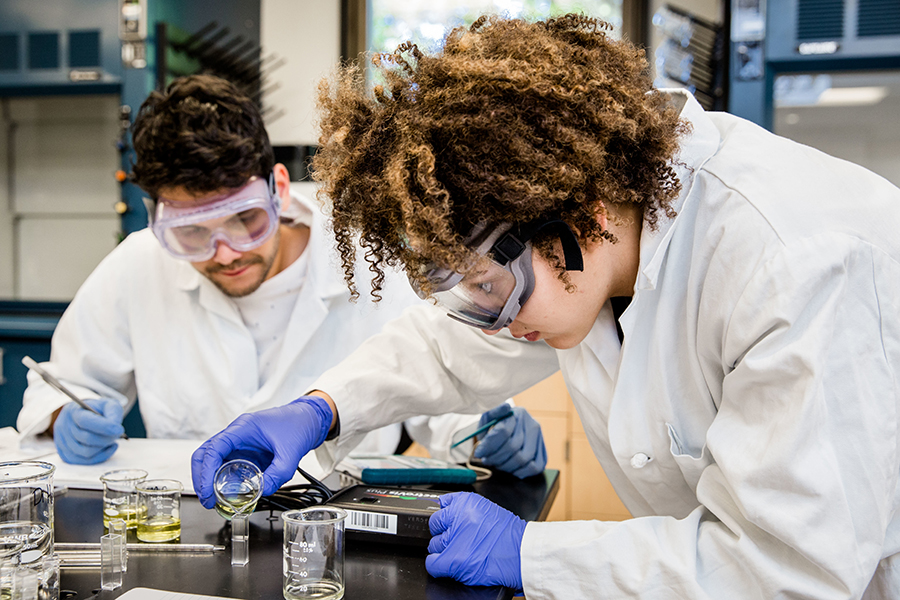About Chemistry
Science at Evergreen weaves together disciplines and offers hands-on experience.
Chemistry is fundamental to understanding the world. Everything is made of chemicals, so chemistry touches almost every aspect of our existence. Chemical technologies provide solutions to problems in health care, materials, and energy generation and usage.
Chemistry is often referred to as the central science because it unites physics and mathematics, biology and medicine, and the earth and environmental sciences.
At Evergreen you can prepare for a career in science, medicine, or education through the study of chemistry. Discover this branch of science using quantitative methods and analytical tools. You'll study the relationship between molecular structure and function. You'll receive hands-on experience with modern lab techniques and research instrumentation.
Evergreen students take part in a wide variety of activities: analyzing trace metals in soils, using spectroscopy to determine the structure of alkaloids, studying chemical reactions critical to living systems, and more. They can also attend professional scientific conferences such as annual meetings of the American Chemical Society, which has recognized the Evergreen Chemistry Club with several awards over the years.
Our science faculty have expertise in a broad range of specialty areas. Our programs connect concepts in experimental chemistry to disciplines like biology, geology, and physics. Here, students engage in work that links theory to practice.
By studying chemistry at Evergreen, you can develop the experience and skills that are essential for solving real-world problems.
Check out related Courses and Programs in the Academic Catalog
Facilities and Resources
Instrumentation
Students of all levels have access to modern chemical research instrumentation, including a 400 MHz FT-NMR spectrometer with multinuclear capability, multiple FT-IR spectrometers, two GC-Mass spectrometers, an ICP-Mass spectrometer, an atomic absorption spectrometer, a CHN analyzer, a UV/Vis-Discrete autoanalyzer, a mercury analyzer and three ion chromatographs.
Laboratory Space
Evergreen has several dedicated laboratories designed specifically for instruction and research in chemistry including a state-of-the-art organic chemistry lab, a high-tech water quality analysis lab, an environmental analysis lab, two modern biochemistry and molecular biology labs, and general chemistry labs.
Computer Application Laboratory (CAL)
The CAL supports the campus community with computing technologies for scientific inquiry.
Learn more about Labs and Studios
Science Carnival and Research Exposition
The largest event of its kind in Washington, the Science Carnival offers hundreds of presentations from Evergreen science students with an emphasis on demonstration, hands-on participation and fun. More than a thousand elementary, high-school and college students and community members crowd Red Square and the science labs to learn and get excited about science. Topics covered include chemistry, computer science, biology, food science, health, physics, optics, geology, marine science and a wide range of other disciplines.
The Evergreen Chemistry Club
A great place for students interested in chemistry—and other scientific fields—to work together to promote science, learn more about careers, develop connections, and participate in interesting community and professional activities, including attending meetings of the American Chemistry Society (ACS). The club has won numerous national awards, including recognition in 2014 from the ACS as a Green Chemistry Student Chapter and an Honorable Mention Chapter.
Explore Student Life
